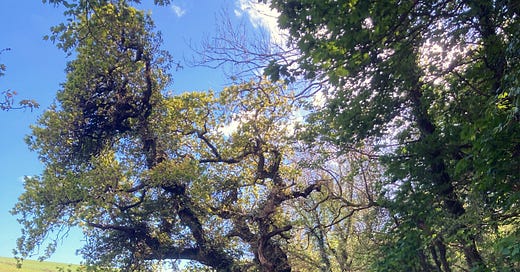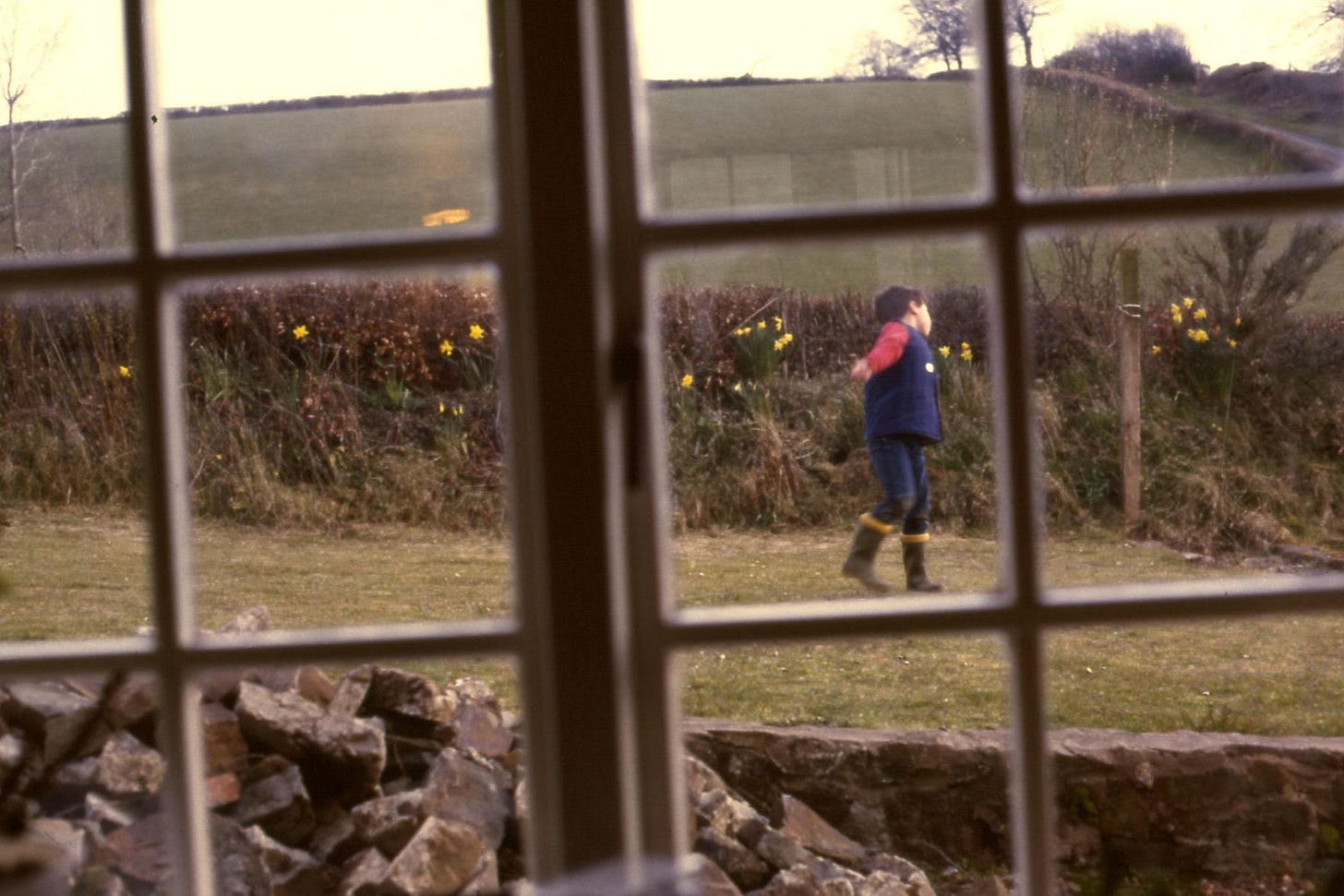April
A unexpectedly special walk, the evolution of a stonking riff, a book recommendation, and four free signed ones I can send you
Being able to go through your life without ever looking back at a you from a previous time and thinking “Ah, you poor unsuspecting overoptimistic idiot, you really have no fucking idea what is coming, do you?” is not a privilege my particular personality type allows for, but I think there might have been a part of me that once assumed such moments would dry up in my 40s. Not so. This April, in the ankle of the United Kingdom’s elegantly arched right foot, as a munificent sun has painted over winter’s depressive monochrome scribbling and the forget-me-nots spill out of the cracks in my driveway both literally and figuratively, my thoughts pivot inevitably to this time of year, in the same county, half a decade ago. Was the weather even better that spring? Did the birds sing even more sweetly? Were the forget-me-nots even more vivid and riotous? It seems so, in my mind.
“Nature is healing,” decreed the people of the internet, frequently, during those days. The phrase was yet to become a darkly sarcastic meme at that point. Freshly back living in my favourite county, I walked for hours along country lanes and riverside footpaths without seeing another soul, swam in deserted breathtakingly cold moorland pools and heard even more cuckoos than I had heard since my previous life as a one-armed 17th Century moorland herbalist. Undisturbed by traffic noise, I lost myself in the resurrection of an old, neglected walled garden. As the pandemic gathered pace, I woke up each day in a state of rapture that was punctured only by the guilt of knowing that I was officially supposed to be feeling all those things others were feeling, such as sad and socially imprisoned and starved of hugs but wasn’t. I am sure I wasn’t thinking “Wow, this Covid business might actually be good for the planet, and transform it back into some revamped version of the 1950s with heightened ecological awareness!” but there was a one-off intoxicating optimism to those weeks amidst all the uncertainty and disorientation. What I definitely also wasn’t thinking was “Enjoy it while you can, pal, because in a few weeks when everyone is unleashed, thousands of wealthy Londoners are going to come down here and completely ruin the West Country housing market for everyone forever, the countryside is going to be strewn with litter and plastic bags full of pug and labradoodle shit; oh, and this house you’re renting is going to turn out to have a chronic damp problem and flood, rendering you seriously ill and terrified of the prospect of being homeless.”
Five years on, the one-off idyll that was rural Devon in April and May 2020 no longer exists, nor does the Devon that had been my home for most of the decade before that. A construction firm has monovomited what essentially amounts to a whole new city on the south east edge of Exeter since then. New greige executive homes with cool-toned floors line the edges of the villages like a cheap IKEAish frame some chancer shoved on your grandma’s favourite painting for twice the going rate. The Lidls that sometimes appear alongside them are like dandelions if only in the sense that you never see them sprouting; they’re suddenly just there. The steep narrow country lanes are full of drivers who have mistakenly decided they are indestructible steel gods, just because they have an SUV, and keep forgetting they now live in a place full of hills and granite and moved from Surrey four whole springs ago. Devon remains an extraordinarily lush and attractive county, but it’s now much more similar than it once was to the places some of us gravitated here to escape from, and quite different to what a lot of people who see my carefully selected photos of its best parts imagine it to be. And you might ask: What right do we have to complain? Why are we so special that we deserve to be exempt from the enshittification of everything?
Even enshittification has its plus points. Maybe. Some people inevitably fight that little harder to make things unshit. Lifelong Devonians have told me Ashburton, on the southern edge of Dartmoor, used to be a “fighting town” but I’ve been here long enough to realise such a description means something a bit different to what it does back in Nottinghamshire, where I grew up. What they probably mean is it didn’t have a deli until 2006. Whatever the case, it’s lovely now, full of independent shops and cafes, such as the gallery/bookshop/gig venue/folkloric temple Field System and the fabulous restaurant Rafikis, doing their best to resist enshittification. It’s also far busier than it was a decade ago, as you’d hope it would be, so establishments like these can survive and flourish. I have a bit of a mental picture of what Ashburton was like in, maybe, 1978, and if I want to flesh it out I just go to Chulmleigh, in mid-Devon. That’s not a slight on Chulmleigh or Ashburton. It’s just to say that Chulmleigh still feels forgotten whereas the days of Ashburton feeling forgotten are long gone. Like the whole of the rest of South Devon, it no longer feels forgotten at all. It feels remembered, most probably via a wall calendar in a posh urban living room, and for those who remember it as it once was, that probably leads to a fair amount of emotional conflict.
When I moved to Devon in 2014, I felt like I could reach out and touch a lost rural past in the way I couldn’t in the East Midlands, where I grew up, or (to a lesser extent) in Norfolk, where I lived for much of my 20s and 30s. The place where I can now still find that feeling is the middle-north of the county, the part that’s always been less fashionable, due to its lack of mainline trains or dual carriageways. Just over a week ago, I went there and walked from a village called Meshaw, a few miles down the road from - and a few miles even more forgotten than - Chumleigh. It’s the kind of place where you have to put an extra bit of weight behind the gates as you open them, due to their stiffness from lack of use. I saw not one other walker over the course of eight miles, but I had another motive for being there, aside from a craving for peace, birdsong and solitude. In the springs of 1980 and 1982 I holidayed in Meshaw with my parents and, having not been back since, was keen to find the cottage we’d stayed in. Here is a photo of me outside it, admiring my first digital watch:
I tend to think of my hair as looking Danny-from-The-Shining cool in this picture, but, as my mum reminds me, it was in fact full of a thriving dynasty of nits, who had made their home there a couple of weeks earlier when I’d been in Nottingham Queen’s Medical Centre, recovering from a burst appendix. The watch had been a present from my parents to celebrate the fact I wasn’t dead (it had been touch and go for a minute or two). I was thin and pathetic, and had just relearned to walk. But our second stay in Meshaw is full of happy memories, including learning to play snooker, listening to Japan’s ‘Tin Drum’ LP over and over again, climbing trees and leaping about in the garden in my new bodywarmer.
Last Sunday, just as I thought I’d identified the extended 21st-Century version of the cottage from a vantage point amidst the lichen-splashed graves on the hill above the village, a woman who’d been watering the flowers in the village said hello to me, and I told her of my mission. “Oh, that’s my house,” she said. Her name was Diana and, on my return from my walk, beside a tractor that looked to have been made some time early in the reign of Queen Anne, her husband John intercepted me outside their party barn and invited me in for a cider. I say “party barn” as it became swiftly clear that was exactly what is was, sometimes making up for Meshaw’s lack of an official villager boozer and hosting up to 80 people, all of whom gather around John’s ancient cider press, which is as near to thing of a beauty that anything vaguely resembling a medieval torture device can be.
Later, after he’d given me a brief summary of his 82 years of farming and apple-based artistry in Somerset, Dorset and Devon, John - who I later found out is known locally as “Cider John” - showed me the even more enormous, even more vintage press he’d purchased recently at auction for the bargain price of £230, and his collection of exquisitely painted and upholstered gypsy caravans, one of which he said is 140 years old and was purchased from Ray Galton.
“You don’t mean Ray Galton who wrote Hancock’s Half Hour and Steptoe & Son?” I asked.
“Yep,” said John. “I went down to Bournemouth and he sold it to I. He used to collect them.”
I was so swept away by the whole unlikely, lovely turn the afternoon had taken - and the half a cider, probably - that I forgot to ask to have a look inside the house where I’d stayed as a 4.9-year-old invalid and 7-year-old wannabe arborealist new romantic snooker champion. I drove away, slightly reluctantly, with two main thoughts in my head. One was about where the Cider Johns of the future are going to come from, as the countryside gets more and more homogenised. The other was a memory from about seventeen years ago when a newspaper asked me to write about walking for the first time, and I asked myself, “Can I do that? Is there anything really to say about walking? Does anything happen on walks?” Sometimes the previous version of yourself you look back at - the one who doesn’t know what’s coming - isn’t such an optimist. And, while they might be a fool, they’re not to be pitied; the experiences in their immediate future are, if anything, to be envied.
I can't think of many songs I've been more obsessed with in recent years than Rick Nelson's version of Summertime, which feels like the raw roots of garage rock. It's also fun taking it as a starting point then tracking the evolution of its riff, and Rick's look.
Here's The Blues Magoos pinching the riff and doing their own thing with it, with excellent results:
And - more famously - Deep Purple becoming its next owners and turning it into a classic slab of construction worker metal:
Finally check out Rick here doing the ace Gypsy Pilot on Kenny Rogers' Rollin' On The River TV show. Being 32, it is plain to see, meant many different things in 1972 to what it does now. Never has ten years of musical progression been more clearly illustrated on a man's face. Plus... the hair! My theory is that Rick's hairline is a hairline that only American men can possess - now sometimes, admittedly, with some "help" but back then totally organically. It's so perfectly straight at the front. I suspect it would not have changed a bit, had he lived beyond the age of 45.
I can’t quite decide what the central factor is that’s been driving me so insanely hard to clear my house of the 5300-plus books that were delivered here five weeks ago as a result of me parting ways with my ex-publisher, but I feel sure it’s either “Hey, keep going, and you’ll be able to put all this behind you and write more books soon!” or “Hey, keep going, and you’ll be able to put all this behind you and read more books soon!” I did, however, find time amidst the endless messaging and packing to read Elspeth Barker’s mini goth classic O Caledonia this month. Originally published in 1991, this is the story of Janet, the sensitive, electric-haired bibliophile occupant of a huge cold Scottish house in the years immediately after the Second World War: friend and empath to all types of animal and embarrassment to her distinctly less sensitive family, with the exception of her father’s reclusive, flower-obsessed alcoholic cousin Lila, whose apprentice Janet appoints herself as.
Maggie O’Farrell, one of the novel’s greatest champions during the years it was perplexingly forgotten, once befriended someone solely on the basis they had cited it as their favourite book of all time, and I can totally see why. Such is its unique wild beauty, its tiny yet untamed perfection, it’s the kind of book that, if you met someone who didn’t get it, might leave you requiring all your strength not to scream “But why? Are you not ALIVE?” and, if you met someone who did, might leave you requiring no less strength not to immediately enfold them in a hug and sign them up as a companion for life. I already feel sure I will read it again and, in the unlikely event that I don’t, I doubt I will ever forget Barker’s description of the day Janet and her frienemy Cynthia ride their ecstatic horses into the sea (“She could die like this and never know the difference, horsed on the sightless couriers of the air…). It is, as the writer Sophie James - who I must thank profusely for pressing a copy into my hands - points out, also sometimes astoundingly funny, for such a deeply sad book. Here’s Barker on Janet’s vividly irritating younger brother Francis, during the scene where Janet and a whisky-sozzled Lila sit on a couple of old chairs on top of an unlit bonfire, stargazing, and Francis sneakily snaps a photo of them with his new camera: “In time to come he was to make a brief reputation for himself with this photograph, and an accompanying article in which he claimed that he had discovered a place in the hinterlands of the Rhine valley where witches were still burned.”
“How are you, Janet?” I said a couple of days ago to a different Janet, who is still alive and well in the 21st-Century, doesn’t, to my knowledge, have a pet jackdaw, and runs my local post office. “Well, I was fine, until you got here,” replied Janet. I’m off on holiday tomorrow: a proper holiday, in another country, which is rare for me. I can’t quite work out who is more excited: me, to be getting a break from working crazily hard and recuperating at an air b&b in South West France, or Janet, to be getting a break from me. I can see the light at the end of the tunnel now, although I still have several hundred paperbacks of 21st-Century Yokel, Ring The Hill and Notebook, and several hundred hardbacks of 1983 piled up in our spare bedroom. Until these are gone, I’m going to be sending all four of them (signed, of course) to everyone who takes a full annual paid subscription to this newsletter, wherever you happen to be on the planet. If those who are overseas are able to cover the postage costs for this project, that is brilliantly helpful, but, if not, no problem - I will still send them. Just drop me an email with your address at hello@tom-cox.com once you have subscribed. Similarly, if you are already on the full annual subscription plan and would like the books for just the price of postage, do let me know. (Please note on all these deliveries that I now won’t be able to send them until I’m back from France on May 7th, getting on Janet’s nerves again.)
My final bit of news for this month is that I now OFFICIALLY have a new publisher who later this year will be putting out my new novel Everything Will Swallow You, the paperback of 1983, and republishing the other five books I wrote for Unbound. But I’ll shut up for now, as today’s missive has already probably been more than long enough, and I will tell you a lot more about that very soon…
See you on the other side, in the best of all months,
Tom










I love footpaths that bend .... they draw you on until you feel so knackered you need to sit sit down amongst the wild garlic and just take pleasure in being alive.
Glad to hear your good news about the new publisher. Hope it all goes well
What a brilliant post. Yes, Devon has changed a lot. We first lived her in 1978 until 1980 when we rented a tiny cottage in Bradninch which was quiet and not a commuter village and had a papershop, a butcher, a Spar, and a hardware shop. I loved it but, we needed to live in places that had easy access to workplaces. We moved back to Devon in 2019 (just in time for the pandemic) and live just outside of Sidmouth. We love it, but it isn't the Sidmouth we used to visit from Bradninch all those years ago. Now , everywhere is busy, and you have to really go out of your way to find the quiet places. But still, today is lovely, and the sky is blue and we can see the sea from our window and a view of Trow Hill. It'll do.